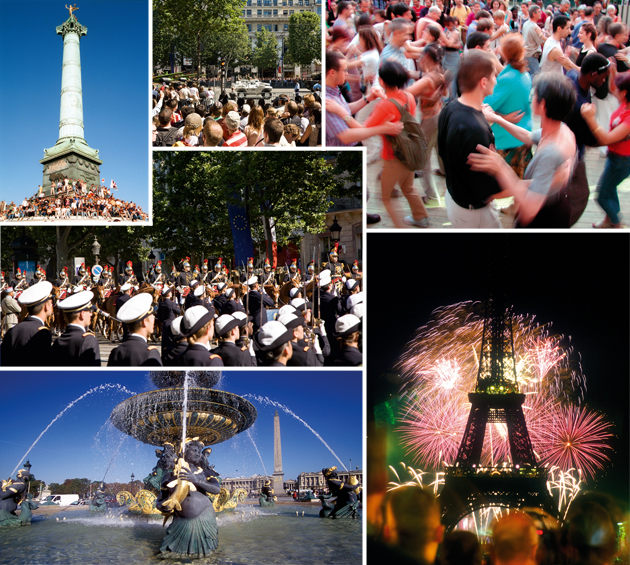
Similar to the United States’ Independence Day, July 14 marks France’s La Fête de la Bastille (Bastille Day), when the Bastille prison that stood on the eponymous square in the 11th district of the city was taken over and destroyed by the people in 1789, marking the beginning of the French Revolution — the day the French overturned their monarchy.
To most visitors, Bastille is a lively Paris neighborhood brimming with bars, restaurants and shops, but la place de la Bastille (the Bastille roundabout), where the July Column stands, marks where the late-1300s-built prison once stood and has become a symbol of French democracy and revolution. However, the actual republic was formed sometime after, in the late 1700s.
Like America’s Fourth of July, Bastille Day is a national holiday of fireworks and dancing all in the name of patriotism. The main highlight is the fireworks display, which will launch from the Bassins du Trocadéro (the pools of the Trocadero; metro Trocadéro, lines 6 and 9) just in front of the Eiffel Tower. They will start at 11 p.m. and last for about a half an hour. Warning: Attending this event is no walk in the park, unless you’re strategically placed, as it feels like the whole world is standing right under the Eiffel Tower with you. A lovely vantage point that isn’t as crowded is Montmartre (metro Abesses, line 12), a hill in the north of the city. And from the stairs of the Sacré Coeur, you have a panoramic view of the cityscape and Eiffel Tower. Another great spot for taking in the fireworks and soaking in the ambience is the Champs de Mars (the stretch of grass behind the Eiffel Tower; metro Ecole Militaire, line 8). But again, if the weather is good, be prepared to picnic with thousands of other revelers. The metro (open and free all night) will be worse than rush hour, and taxis are scarce on July 14, but it’s worth heading to the center for the atmosphere.
A traditional ball on Place de la Bastille is organized on the eve of the fete — it includes free concerts with contemporary French and internationally renowned bands. Continue the celebration either on the same night (July 13) or the following evening at one of the firemen’s parties that take place at fire stations all over the city. It’s a quirky but fun tradition with lots of wine-fueled dancing. The events are complimentary but donations are usually asked for at the door. A full list of Bal des Pompiers (firemen’s fetes) is available on the Paris city website.
If you want to get into the spirit of things early on in the day, the military parade starts at 9 a.m. at Place de l’Etoile, where the Arc de Triomphe (metro Charles de Gaulle-Etoile, lines 1, 2 and 6) stands, and runs the length of the Champs–Élysées to Place de la Concorde, where at 10 a.m., French President François Hollande joins the parade and is greeted by chief of defense Édouard Guillaud and his troops.
There is a wealth of concerts and performances happening in the streets and bars throughout the city on the holiday; some of the larger events include free classical music concerts at the foot of the Eiffel Tower (9:30 to 11 p.m.) and a complimentary ballet show at 2:30 p.m. at the majestic Palais Garnier opera house (8 rue Scribe, 9th arrondissement; metro Opéra, lines 3, 7 and 8). Additionally, entry to the Louvre Museum (metro Louvre-Rivoli, lines 1 and 7) is free all day.
